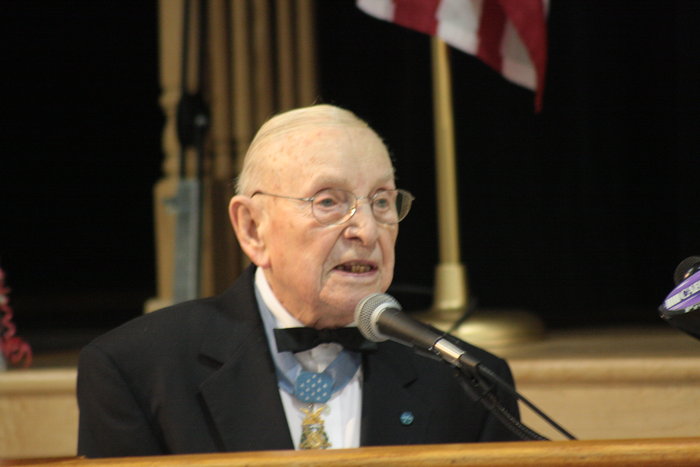Bayonne native Nicholas Oresko, who won the Medal of Honor for his actions in World War II, died at 96, from complications of surgery.
At five foot, seven inches tall when he enlisted in the U.S. Army during World War II, Oresko thought his height might interfere with his dreams. He wanted to be everything from an airplane pilot to a firefighter, but he never imagined he would win the Congressional Medal of Honor, or that he would live to see a school in his hometown of Bayonne named for him.
Yet both of these things happened when the Bayonne School District named former P.S. 14 after him when the school reopened in 2010.
At the time, he said, as a boy, his mother had urged him to remain in school; something he thought was wise advice.
Oresko served as a master sergeant during what is commonly called “The Battle of the Bulge” near Tettingen, Germany. He singlehandedly defeated an entrenched German bunker. Despite being wounded, he went on to defeat a second bunker. President Harry S. Truman awarded him the Medal of Honor on Oct. 30, 1945.
Prior to enlisting, Oresko worked in the shipping department for Standard Oil Company, based in Bayonne. When war broke out, he enlisted in the U.S. Army. After training, he shipped out to Europe, where he saw combat in France, and later, Germany. In January 1945, when the Allies were attempting to take a German stronghold, his unit was ordered to the front line.
“We were supposed to take out two machine guns that were at the top of the hill looking down at us,” he said. “We couldn’t see them. But they saw us. Every time we attacked, we would lose some people.”
Despite two days of bombardment by American artillery, the Germans remained unmoved. So on the third day, Oresko decided his company had to handle the situation. But when he started the attack, none of his men came with him.
“I looked up at the sky and said ‘Lord, I know I’m going to die. Let’s just make it fast,’” he said. A cold wave came over him, he said. He was numb, and not in his right mind.
“So I was alone. You can’t imagine what it means to be alone in a battlefield, with your men on the ground and the Germans in front of you. What do you do? You just keep plugging along step by step, and well, if I’m going to die for my country, I’m ready,” he said.
And then all hell broke loose. There was a lot of screaming, yelling, shooting, and confusion, but then he came back to reality. He thought they had missed him. His rifle belt and coat were full of bullet holes. But he had been knocked down. It wasn’t until he started to crawl that he noticed the blood running down his leg.
“I was wounded seriously,” he said. “Then it started to hurt.”
He got weaker, but kept trudging ahead until he found himself under the enemy emplacement. The Germans thought he was dead. So he figured he would throw a grenade in there. But when he felt his jacket for the grenades, he found them gone. He had dropped them while crawling there. So he went back and got some, threw the grenade into the bunker, then after the explosion, went up and began shooting. Then it was over.
“I couldn’t believe how quiet it was,” he recalled.
An officer in his unit later called his action the finest example of quick thinking and courage he had ever seen.
As a tribute to his heroism, an army unit in Afghanistan sent a flag to the hospital where Oresko had undergone treatment.
Al Sullivan may be reached at asullivan@hudsonreporter.com.
